This is the initial post of a triple on CCP influence in Australia and New Zealand. The first two pieces are a prelude to former PRC diplomat Chen Yonglin’s 2016 China in Perspective piece on Australia as “China’s backyard”, presented for the first time in English.
0. Leading from the back end
1. The cis-Tasman yard
2. Chen Yonglin: Australia as China’s backyard
Antipodean developments lured this blog away from its usual northern haunts last year. In September, Anne-Marie Brady published a comprehensive treatment of United Front (统一战线) activities in New Zealand (Magic Weapons: China’s political influence activities under Xi Jinping; for the history of the Maoist ‘magic weapons’ (法宝, dharmaratnāni), cf. this post by Victor Mair). The CCP’s use of the political, business and academic élites of foreign countries for its policy purposes is a well-known aspect of United Front work, but the success of such ‘work’ in New Zealand, Brady’s systematic presentation of it, and reactions from the local élite make Kiwi United Frontics worth following even for those not specifically concerned with South Pacific affairs.
My interest in New Zealand politics had been triggered somewhat earlier, when I came across what I believed was a hoax attempting to discredit Labour MP Raymond Huo (霍建强) and his party by associating them to a bizarre Xi Jinping quote (‘roll up your sleeves and work hard(er)’) known for its masturbatory overtones and other pun potential (cf. “Comrades, ‘hike up your skirts for a hard shag’“). Only after extensive consultation and analysis, with many a face-palm, could I conclude that the quote was very much authentic, and Huo had been kite-flying it in earnest as the official Chinese version of Labour’s campaign slogan. After Brady’s report came out, I embedded my comments on the Xi quote (‘Skirts lifted, jewels unveiled’) into a post that detailed how the major political parties in New Zealand have essentially outsourced the political representation of a minority to individuals linked to organisations controlled by the Party-state (“United Frontlings always win”, in turn embedded into a China Heritage post (Geremie Barmé, “The battle behind the front“)).
For brevity, my ‘United Frontlings’ post focused on two individuals, Huo the rolled-up sleeved Xi-quoter and National Party MP Yang Jian 杨健, famous for his PLA intelligence background. While nominally competing for the Chinese-speaking electorate, Yang and Huo are functionally United Front eggs in different baskets. But various degrees of CCP influence are apparent across New Zealand’s political class, way beyond the Yang-Huo double act. Magic Weapons discusses political donations to the major parties, business links to politicians or their relatives, SOE jobs for former office-holders, MPs in Belt-and-Road lobbying groups, all traceable to United Front organisations and various entities linked to the Party-state. It’s a Who’s Who of New Zealand’s élite politics: former prime ministers Jenny Shipley, John Key and Bill English; former Labour leader, Auckland mayor Phil Goff; former National leader Don Brash; National MP Judith Collins, the ‘fun’ candidate to lead her party [UPDATE: she lost]. Better-known cases of successful PRC influence involve autocracies, structural corruption, ideological affinity, resurgent nationalism, debt diplomacy; in New Zealand, a prosperous, stable democracy among the least perceivedly corrupt, dependent on China for less than a fifth of its exports as of 2016, what has been published about CCP influence provides evidence for the effective exploitation, using legal, if little transparent, means, of a lack of relevant area expertise in policy-making, business influence on politics, and politicians and officials’ appetite for retirement options. Despite obvious differences, many of these tactics could be replicated in other Western small states, in particular some in Northern Europe, under this blog’s official remit.
With a sizable Chinese community, New Zealand is also the arena for the CCP’s long-term battle to win overseas Chinese support for a range of domestic and international strategy goals. Overseas work has been largely successful, at least at the leadership level, aided in part by attitudes among the monocultural majority that have evolved from a racist past to a form of respectful ignorance and undiscerning acquiescence with the pro-CCP takeover of community organisations. Those not conforming to the views of the alliance between the political-business élite and United Front organisations can expect to be doubly marginalised. As one Chinese Kiwi recently put it: in China, you have to cope with being a dissident, and abroad, with being both a dissident and Chinese.
Information has continued to emerge since the publication of Brady’s report. In this post, I will discuss two events that illustrate New Zealand’s outsourcing of ‘Chinese affairs’ to the Party-state, with an excursus on state efforts to control student organisations, before concluding that these achievements of United Front work are unlikely to be undone in the medium term.
Kiwi pollies mark the Year of Cerberus
The Magic Weapons have been inordinately effective in ensuring New Zealand’s cooperation with certain aspects of CCP propaganda efforts. One key goal of United Front work is to win the loyalty of overseas Chinese communities (by a broad jus sanguinis definition that purports to include even the descendants of people who emigrated a century before the PRC’s establishment), attempting to identify the CCP with all expressions of Chinese culture; another is to present a positive image of the Party-state’s leadership to non-Chinese-speaking foreigners, legitimising it as supported by the ruling élites of as many foreign states as possible. New Zealand’s politicians provide help towards both these goals.
According to a source with knowledge of the matter, recent requests from a CCP-unfriendly NZ Chinese organisation to have ministers send Chinese New Year greetings were reportedly redirected to Raymond Huo, effectively making the ruling party’s leading United Frontling, whose PRC-consonant views are well–known, the government’s gatekeeper to contacts with the Chinese community. In contrast, ministers and other politicians didn’t hesitate to attend celebrations with PRC diplomats. In other words, the Party-state, through its local advocates, can vicariously veto official support for something as apolitical as a calendrical festivity, at least when the persons seeking such support happen to have Chinese surnames. Brady has quoted a “senior Chinese diplomat” as comparing New Zealand’s relations with China to Albania‘s dependence on the PRC during the ’60s; prophetically enough, Enver Hoxha’s name in Chinese (恩维尔·霍查) is interpretable as ‘[the Party’s] Benevolence (党恩) holds thee [and all else (Shi 191.3)] together; [Raymond] Huo inspects’.
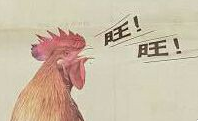
鸡犬立而吠。 Cerberus, immanis ianitor Factionis.
Source: KPDNKK.
Still in the Avian Year, NZ grandees offered the Party-state fulsome praise at international propaganda events. Last November, former National PM Dame Jenny Shipley attended Chau Chak Wing 周泽荣’s Imperial Springs Forum. Dame Jenny, further elevated to the dignity of a China Construction Bank (建设银行) employee, attended a post-forum audience with Xi Jinping in Beijing, where her praise of Xi and his Belt-and-Road Initiative made it into a People’s Daily piece proclaiming the world’s support for ‘the Chinese Approach (中国方案)’. National’s president, Peter Goodfellow, quoted as valuing “the Chinese” because “they don’t complain and they pay up“, sent a congratulatory message to the 19th Party Congress, as did his Labour counterpart, Nigel Haworth, who also showed up in person at the Auckland consulate to talk about “Xi Jinping’s wise leadership“. Haworth also attended an ‘interparty’ meeting between the CCP and assorted foreign parties in December; he praised Xi’s speech on camera for state media CGTN: “I think he is taking a very brave step, trying to lead the world to think about global challenges”. (Ironically, before becoming an apologist for an authoritarian regime that jails labour activitists, Haworth had an academic career specialising in Latin American labour movements. One has to wonder what insights from that field led him to develop a sincere admiration for the likes of Pinochet.)
Huo as unofficial gatekeeper and all the official Xi-fawning should suffice to illustrate how New Zealand’s main political parties actively work to advance key aspects of the CCP’s propaganda work.
Jobs for the Frontlings
New Zealand leads the world, not only thanks to its pioneering time zone, but in terms of official interaction with United Front organisations. The political determination to outsource Chinese constituents to CCP-affiliated groups isn’t limited to the ascent of United Frontlings Yang and Huo. When Brady’s report came out, Labour was running another ethnic Chinese candidate, Chen Naisi 陈耐锶. A law student who sounded like a candidate malgré soi (Brady quotes an interview where she claims to be “not in the least bit interested in politics“), Chen has an important position that might have justified Labour’s choice: the former presidency of the New Zealand Chinese Students and Scholars Association (CSSA, 中国学生学者联合会) and current vice-same of its Auckland chapter. As we will see, Chen didn’t become an MP, but was appointed to a largely taxpayer-funded post of some significance.
The significance of Chen’s appointment might not be obvious to a casual observer. What’s so unusual about a student leader becoming moving into ‘grown-up’ politics, or about someone born in the PRC leading a primarily PRC student organisation? Unlike the well-connected politicians and officials described above, Chen has hardly begun a career, and is, by herself, not terribly influential in NZ-PRC relations. Some of her views, quoted below, are rather remarkable, but the significance of her post lies in her capacity as CSSA leader. In the following digression, I will detail how, while CSSA membership can have little to do with politics, leadership of a CSSA chapter implies a willingness to work under the direct ‘guidance’ of the Party-state, as well as a degree of ideological agreement with it, often subject to the evaluation and supervision of PRC diplomats. As will soon become clear, Party-state control over overseas student organisations is mandated by Party regulations, has been documented by specialised academics, is observable through state-media sources, and is readily declared by the organisations themselves, also in New Zealand. Not only is agreement with authoritarianism apparently compatible with mainstream New Zealand politics: a major party and a state-funded organisation actively seek to work with a United Front group, perhaps trying to ‘improve China ties’ by giving jobs to those (correctly) perceived as linked to the Party-state.
Correct guidance
CSSAs have been receiving some English-language attention of late, highlighting state connections that remain less than obvious to the non-Chinese-speaking public. In Australia, Alex Joske has been researching them for some time; see e.g. his piece with Wu Lebao 吴乐宝, and a fuller treatment in a section of the Hamilton-Joske parliament submission. Even a cursory look at CSSA Chinese-language websites will show that they’re typically established by the local consulates or embassies, that often contribute funding and ‘guidance’. For convenience, a wealth of screenshots showing these links, primarily in US universities, has been shared these days on a micro-blogging site, notably by Shawn Zhang 章闻韶. After a recent piece focusing on one particular instance of Embassy funding, Bethany Allen-Ebrahimian is working on a longer treatment [UPDATE (Mar 7): Allen-Ebrahimian’s piece, with contributed research by Shawn Zhang, is out; plenty of detail on American CSSAs, based on multiple inside sources.]. Chen’s organisation, the Auckland CSSA, fits in this picture: a 2012 state-media article describes the association as “under the correct guidance of the education section of the Auckland consulate”. CSSAs are an aspect of the Party-state ‘Diaspora Affairs’ (侨务 qiaowu). James To notes that education attachés at diplomatic outposts began establishing CSSAs to support and ‘guide’ students abroad so as to “raise their patriotism” soon after 1989, as part of a general turn to nationalism intended to prevent the reemergence of dissent. The 1992 “State Council General Office Circular on matters relating to students studying abroad” (国务院办公厅关于在外留学人员有关问题的通知(国办发[1992]44号)) is clear about these policies: Chinese students abroad are welcome (or, if on government scholarships, required) to return, and graciously forgiven if they have been associated with “organisations opposed to the Chinese government”; those who take foreign passports must renounce PRC citizenship and will be “treated as ethnic Chinese of foreign nationality” (i.e., within the purview of qiaowu work); embassies and consulates are instructed to support them, as well as inform them of “our country’s situation”; students must be “educated” to respect local laws while “loving the motherland, protecting its reputation and interests and earning glory for the country”.
While these directives have been systematically implemented for decades, the Xi Era’s emphasis on United Front work also includes a stronger engagement with students abroad. In May 2015, in a speech at the work meeting of the Central United Front Work Department, Xi referred to those who study abroad as a “new focus of United Front work“. Within days, state media was featuring the work of the CSSAs and quoting selected CSSA leaders worldwide who answered this “call from the Motherland”, while popularising the gist of the speech on social media.
Quotes from the speech continue to be repeated and elaborated in doctrinary writing. A recent example is this piece published on Party theory magazine Qiushi 求是 under the Marxist Theory Research and Construction Project (马克思主义理论研究和建设工程) analysing Xi Jinping’s thought on the United Front, again with the “new focus” dictum.
The Party Central Committee’s 2015 “Regulations of the Communist Party of China on United Front Work (for trial implementation)” (中国共产党统一战线工作条例(试行)) include students abroad and back from overseas within the purview of United Front work, highlighting the role of the Western Returned Scholars Association (WRSA, 欧美同学会(中国留学人员联谊会); a venerable association no longer restricted to those who studied in the ‘West’). The WRSA, a United Front organisation, is having its purview extended to include supporting and liaising with students abroad and their organisations, pursuant to a set of recommendations issued by the Party Central Committee in 2016, emphasised in suggestions by a government-affiliated think tank ‘partnered’ with the WRSA, with which its leadership overlaps, and visibly implemented in links to at least some CSSAs.
The Ministry of Education (typically responsible for ‘guiding’ CSSAs through the education sections at diplomatic missions), in a celebrated directive from its Party organisation calling for more patriotic education, also called for the propagation of Xi’s “Chinese Dream” to students overseas through a network linking “the Motherland—embassies and consulates—overseas students groups—broad numbers of students abroad” (original; NYT coverage).
While this firmly anchors student organisations in official state policy and United Front doctrine under Xi, a recent example can illustrate the importance of students overseas for Xiism and show coordinated state ‘guidance’ of the CSSAs at work.
The Muscovite Letter
On 30 December last year, Xi Jinping replied to a letter from the Moscow State University CSSA on such edifying topics as the spirit of the 19th Party Congress. Its authors included the MSU CSSA’s president, Lu Sentong 卢森通, a lawyer who has also held positions at the Russian Association for the Peaceful Reunification of China (a United Front group) and the Union of Chinese Students in Russia (中国留俄学生总会, Союз китайских учащихся в России), to whose presidency the embassy has just elevated him. The letter was reviewed and forwarded to Beijing by the Embassy. Xi’s reply stops at around 300 characters, mostly used to extol the role of the young in the Rejuvenation of the Chinese Nation and setting up a parallel to Mao’s 1957 speech at the same university during his visit for the Moscow Conference.
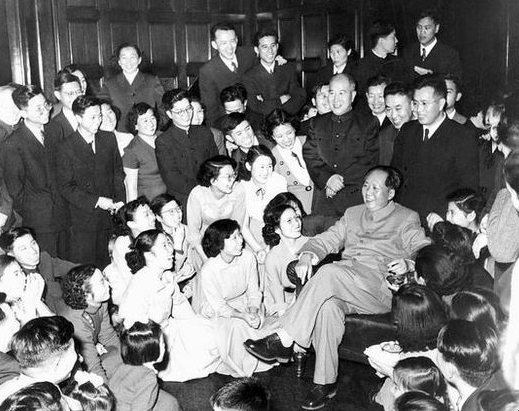
像早晨八九点钟的太阳。Inter ludis virgines, stellis nebulam candidis spargis.
Mao Zedong with diplomatic staff and student representatives at the Chinese embassy. Moscow, November 1957. Source.
State media found the missive newsworthy. On the very 30th, the letter was read on China Central Television, during the 7pm news (Xinwen lianbo 新闻联播). Selected students, including the CSSA leader, watched it live at the PRC embassy.
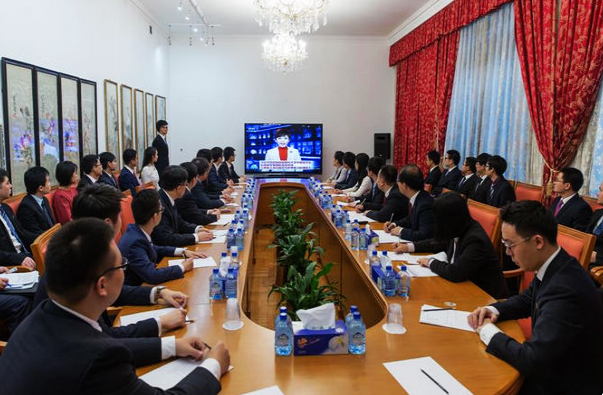
Students including MSU CSSA leader Lu Sentong 卢森通 watch the Imperial reply to their letter read live on Xinwen lianbo. PRC embassy in Moscow, December 30th, 2017 (Source). As of press time, it’s unclear if prior warning existed that Xi’s missive, dated that very day, had been given, or if the students and diplomats just happened to dress like that and meet up at 2pm on a Saturday to watch the universally loved broadcast.
The People’s Daily published Xi’s reply on its front page the next day.
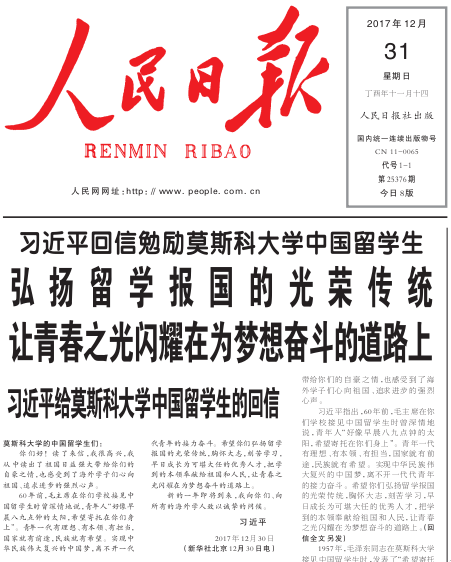
People’s Daily, 31 December 2017.
Education sections of diplomatic missions worldwide then proceeded to organise study sessions with students and scholars under their jurisdiction, in order to analyse the ‘spirit’ of Xi’s reply. This process, involving CSSAs and other groups, was then widely reported by state media, government-affiliated sites and publications, and some of the associations themselves on their websites and social media. The WRSA, the United Front organisation given increased jurisdiction to liaise with those who study abroad, has also reported on these exegesis sessions; it also organised what could be seen as the Mother of All Muscovite Missive Exegetics Meetings, attended by Dai Junliang 戴均良, deputy director of the Central United Front Department. The exoprop system was also set in motion to bring the good news to foreigners, even including such foreign partners as TASS, thanks to its increasing cooperation with PRC media.
The spirit of the Moscow Letter was studied in Singapore, Sweden, the US, Finland, South Korea; in Moscow, again; and in Aukcland, where, already on 31 December, the Consulate arranged a forum with students and visiting scholars. (The Auckland session didn’t involve the CSSA, but a small group of students on government scholarships (公派), who are more often expected to participate in this kind of event.)
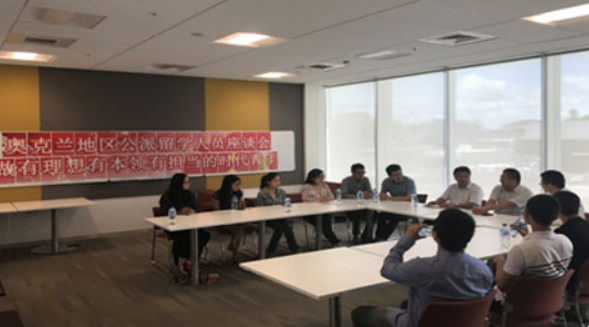
Season’s Greetings: Auckland New Year’s Eve Xi-Exegetics session organised for students on government scholarships, by Consular injunction. The banner quotes Xi’s 19th Party Congress report, with one character missing I believe (source).
No such thing as a discounted lunch
The global pantomime set up to fête Xi’s 300-odd characters is only one example of centrally coordinated political work aimed at students overseas; similar events, including ‘study sessions’, took place at other junctures, such as, of course, during the Party Congress. Of course, this doesn’t imply that political work constitutes the bulk of CSSA activity, or even a significant or noticeable part of it, as experienced by most members. Much as in the case of other student groups, the point of CSSA membership is surely access to social events, various forms of support or such goodies as restaurant discount vouchers, rather than the privilege of attending study sessions with Their Excellencies. In many cases, as in the rather poorly attended New Year’s Eve Imperial Moscow Correspondence Exegesis Symposium in Auckland, or, say, the Party Congress study session at Australian National University, involving the relatively rare sight of a (possibly ad hoc) Party cell on foreign soil, political work is only for visiting scholars or students on state scholarships, sometimes not even involving the actual CSSAs. On special occasions, however, the broad masses of CSSA members can be summoned, and not a few will respond: Hamilton and Joske describe the embassy-organised rallies to welcome Li Keqiang to Australia in 2017, with “hundreds of students” who were trained, and assigned roles in groups that included “security squads”.
Like other external groups involved in United Front work, the CSSAs spend most of their time and resources on non-political activities that offer actually useful services to a certain non-Party social group of UF interest. Members can be attracted by any number of incentives, from ‘discounted lunches’ to patriotic spirit. On the other hand, leaders of such organisations are surely clear about their political role: they place themselves under the ‘guidance’ of the education section of the local diplomatic mission (as in the case of Chen’s Auckland organisation); their election sometimes even takes place on consulate premises; candidates can be subject to the approval of a consulate, or directly designated by the embassy. A CSSA leader such as Labour’s Chen Naisi can’t credibly claim independence from its ‘guiding’ entity.
Chen’s own public statements are worth quoting. Asked about the revelations about Yang Jian’s military past during an English-language interview before the election, she claimed they would have “increased the level of support for Yang from the Chinese community.” She thought the community would have “emphatised” with Yang. Since the ‘community’ was actually divided over Yang, Chen probably had in mind her own ’empathy’ for a political adversary. She added: “In China it’s very hard not to have anything to do with the Communist Party, or even the military regime itself. It’s part of the working life. The hospital, the schools are all part of the regime.” Such a statement is either trivial (state institutions are of course somehow related to the Party in a one-Party state), or false (it’s not particularly easy to become a CCP member, let alone to have a career at a PLA institution; Yang’s career has little in common to that of, say, an average SOE employee).
Hätt’ ich nicht so viel getanzt
Although Chen lost the election, thus succeeding in staying away from all the ‘uninteresting’ politics, she is an advisor to the New Zealand China Council, a partially taxpayer-funded “cross-sector, peak body for the New Zealand-China relationship”. Its Advisory Council also includes both United Frontling MPs, Yang and Huo. Led by a former official turned consultant without known Chinese expertise, the Council works as a lobbying group advocating Xi’s Belt and Road Initiative, sometimes in cooperation with such organisations as Confucius Institutes (cf. a recent “Belt and Road Forum“, a genre affectionately known as BARF). His own website shows him performing a bowing dance, too cringey to reproduce here, in front of Li Keqiang 李克强, to his Premierial hilarity.
Chen Naisi is certainly politically junior to well-connected United Frontlings Yang and Huo, but her organisation’s profile and her own views leave no doubt that, by giving her such visible roles, Labour and the NZ China Council are signalling their acquiescence with relevant CCP policies. Labour, just like National, clearly agrees that the CCP’s United Front organisations have a natural right to represent New Zealand Chinese. The Council is also clear in its commitments; it has summarily dismissed the evidence of CCP political influence operations, and reaffirmed its advocacy of Xi Jinping’s geopolitical Initiative.
Conic relief
Soon after the revelations on Yang Jian and Brady’s report, Michael Reddell, an economist and former official, complained of the “cone of silence that seem[ed] to have descended over elite New Zealand” around Yang’s case. Indeed, Yang remains an MP, was consistently defended by Bill English, former PM and until recently leader of the National Party. I don’t think I’ve seen any senior Labour politician air the slightest criticism of a rival MP with a background in PLA intelligence. As seen above, senior politicians, officials and state-funded lobbyists continue to offer adulation to the Core and to advocate his Initiative. Local coverage has been modest, mostly limited to the work of one investigative journalist, Matt Nippert, at the nation’s paper of record, and some articles from news outlet Newsroom.
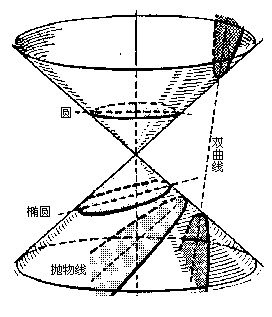
原委如此。Conus insignis galeae cristaeque comantes. Source.
Brady was quickly placed under the cone. When Chris Finlayson, then the attorney general, was asked about Yang’s case and Brady’s work at a campaign event, he refused to “respond to any of the allegations” against Yang (which allegations Yang has confirmed himself) and proceeded to complain about “a whole class of people” being “singled out for racial abuse”, before insulting Brady: “I don’t think she likes any foreigners at all.” While her work has been quoted by scholars and journalists the world over, and was probably a key factor in initiating the current scrutiny of Chinese influence in the West, it has had little visible effect in her own country. Reactions came from state nationalistic tabloid Global Times (环球时报), which posted a piece through social media quoting NZ-based “young scholar” Ken Liu (Liu Yuxi 刘羽西) attacking Brady’s views (since she “lacks understanding of China and still looks at it using Cold-War thinking”). Liu is a member of the NZ China Friendship Society, as well as of the All-China Federation of Returned Overseas Chinese (中国侨联), a United Front group. He has contributed praise of China’s political system to Skykiwi (天维网), a Chinese-language website linked to state media.
Ardern’s concerns
A more kinetic response followed. Brady had her office and house burgled. Laptops and phones were stolen, while “[[o]ther] valuables weren’t taken”. The burglaries did generate considerable press coverage; PM Jacinda Ardern expressed concern about possible links between the attack and Brady’s work, and announced she would “be asking some questions” of the intelligence service.
Whatever indignation the Relevant Burglaries might generate, New Zealand’s political, business and academic landscape makes it rather unlikely that the CCP’s influence operations will be seriously questioned. Ardern might be sincerely concerned about people being burgled, but, if my sources are to be believed, her government continues to keep a United Frontling as gatekeeper to Chinese-community interaction. Her party is presided by an apologist of totalitarian ‘wise leadership’. Her Loyal Opposition has even stronger CCP links, takes pride on its PLA-intel man; National, and so perhaps one day the government, might [UPDATE: not so] soon be led by Judith Collins, the peculiar business background of whose family couldn’t be freely discussed when she was a minister, and could become fully taboo under her premiership.
As observant readers might have noticed, Brady’s surname pops up rather frequently in this and other accounts of Zelanian United-Frontics. Brady is a well-known scholar and has pioneered the subject, but it’s rather unusual to see almost no one else broach the topic. New Zealand has, after all, a fair number of Sinologists; their silence speaks volumes. Discussion of CCP influence elsewhere has led to vigorous debate, while in New Zealand it’s just Brady. Brady, shm(r)ady!
More generally, nothing suggests a change is imminent in the monolingual, monocultural majority élite’s view of China (and everyone and everything ‘Chinese’) as an exotic totum that will rain deals, junkets and votes on you if you just help it conceal its dirty laundry, ape the lingo of its eternal Leader, entertain it with a mock-Asian bowing dance and show it your stupeur et tremblements. While an obvious improvement over ethnic prejudice, this is still intellectual laziness. Our favourite Frontlings know how to play the ‘inscrutable’ card to the China-naïve: when confirming he hid his background from the public, Yang Jian said the “system” in China was too “complicated”; Raymond Huo called his prosaic Xi-speak election motto “an auspicious Chinese idiom”; Chen Naisi explains Yang’s background as just everyday life in China, comparing PLA intel-school staff to rank-and-file SOE employees. If you don’t know Chinese, can’t find China on a map of China, and are too lazy to learn, those are acceptable responses. Such organisations as the NZ China Council, ~⅔-funded by the public to play a role in engaging with a major trade partner, are led by the China-illiterate, and effectively outsource all thinking tasks to advocates of the entity they’re meant to engage. When it comes to China, common sense is suspended; or do how-to-negotiate books sold at Wellington Station teach you to let the other side do your due diligence for you?
As it continues to slide down the BARF-y Road, New Zealand is worth keeping an eye on for those interested in United Front Work and techniques for coopting Western élites. Since no policy change seems likely, one should expect United Frontlings and the motley prancing lobbyhood will at least stay funny. Huo’s borderline-onanistic Xi-speak campaign slogan is admittedly hard to beat, but the ever-gushing geyser of what Barmé calls New China Newspeak will hopefully produce something on time for the next election. Should the Nats need an advisor, I might try and merge Holyoake’s “Steady does it” into Xi’s Donkey Theory (驴论); but there’s surely more potential in an amalgam of Xi’s rerefloatment of Mao’s “Knife Handle [in the Party-and-people’s hands]” (党和人民手中的刀把子) and Judith Collins’ “I stab from the [F]ront”.
This concise introduction to the Backyard piece will now continue across the Ditch.
[…] about the New Zealand situation is the author of the pseudonymous blog Jichang Lulu. He has a new and substantial piece (if characterised by an idiosyncratic style) on the United Front activities in New Zealand, which […]
[…] desirability of perpetual dictatorship are also common among New Zealand’s policymakers; an earlier post of mine might help inform an informed […]
[…] New Zealand council welcomes a local Xiist lobbying group and ‘their’ BRI. Source: […]